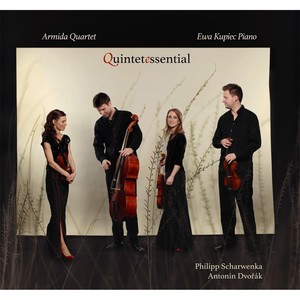
Quintetessential
- 演奏: Ewa Kupiec (钢琴)
- 乐团: Armida Quartet
- 发行时间:2015-06-08
- 唱片公司:solaris records
- 类型:录音室专辑
- 歌曲
- 时长
-
作曲家:Philipp Scharwenka
-
作品集:Quintet for Piano, 2 Violins, Viola and Violoncello in B Minor, Op. 118
-
作曲家:Antonin Dvorak
-
作品集:Quintet for Piano, 2 Violins, Viola and Violoncello in A Major, Op. 81
-
作品集:Quintet for Piano, 2 Violins, Viola and Violoncello in A Major, Op 81
简介
Ewa Kupiec / Armida Quartet by Dr. Agnieszka Schneider Antonín Dvořák (1841–1904) Quintet for Piano, 2 Violins, Viola and Violoncello in A major, Op. 81 1887 Philipp Scharwenka (1847–1917) Quintet for Piano, 2 Violins, Viola and Violoncello in B flat minor, Op. 118 Dedicated to Max Reger 1910 He “now likes looking for old sins” – is how Antonín Dvořák phrased it as he began to rummage through old, discarded scores in 1887. He would “still have quite a lot in his old suitcase”, which obviously made the search for usable pieces worthwhile. He remembered one of his very early works, the Piano Quintet, Op. 5. With this composition, however, he was – 15 years later – no longer satisfied. So he applied himself without any further thought to a new one and finished it within a few weeks. As early as January 1888, the Piano Quintet in A major, Op. 81 was premièred in Prague. Ewa Kupiec at the piano together with the Armida Quartet have now recorded it. Placed on the side of this popular chamber music work, is a rediscovered and to-be-rediscovered work of the same genre as the Piano Quintet B flat minor, Op. 118 by Philipp Scharwenka. The idea to this CD was born after their joint performance at the Heidelberg Spring Festival in 2012, which marked the prelude to an equally fruitful musical collaboration for Ewa Kupiec and the Armida Quartet. “Together with Ewa, we have experienced incredibly beautiful moments of musical fusion on stage. Without the use of words we have created something that cannot be practised. We have taken this experience into the studio, which was very inspiring. Music is being created in the moment and it is a very lively art; one lives in and for this one musical moment to which one can surrender oneself entirely – this delight in the presence we share with Ewa.” All five artists shared the wish, with this recording, to also present “a lesser-known piece” to the audience, one that “fits well with Dvořák”. In search for such, they discovered the Piano Quintet by Philipp Scharwenka from 1910. “To make Philipp Scharwenka's chamber music available in re-editions again is the order of the day. For too long has the compositional heritage of this great, to absolute sound quality and melodic invention committed, romanticist remained in the archives.” This assessment of the Scharwenka Foundation is also shared by Ewa Kupiec and the members of the Armida Quartet. For Ewa Kupiec, these two works are connected through “the driving, tremendous energy in fast movements and a wonderful melancholy in slow movements”. Martin Funda, member of the Armida Quartet, even sees an “absolute earworm potential”, because “...this music is incredibly colourful, with nearly impressionistic features. Due to its ingenious design, it simultaneously sounds elated as well as melancholic – a fascinating mix. There are marvellous melodies, vibrant middle voices and gritty rhythmical sounds.” In reply to the question of why the works of Philipp Scharwenka – after all, a renowned composer in his lifetime – are not yet part of the repertoire, Martin Funda explains: “Philipp Scharwenka strongly focused his career on pedagogy. He was the head of one of the leading conservatories of his time. Nevertheless, as a composer, he enjoyed a high reputation among his contemporaries (Max Reger dedicated his Op. 26 to him!) and had an equally noteworthy talent for drawing. However, these wide-ranging activities, of course, only explain why Scharwenka's oeuvre comprises merely about 120 works. It is probably more likely that Scharwenka was simply somewhat outshone by the omnipresence of his contemporaries Dvořák and Smetana. But this music is absolutely worth listening and deserves to be played without a doubt!”

